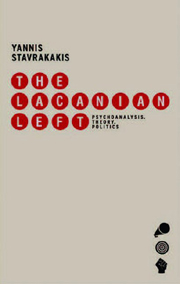Book contents
- Frontmatter
- Contents
- Bibliographical Note
- Acknowledgements
- Dedication
- Introduction: Locating the Lacanian Left
- PART I Theory: Dialectics of Disavowal
- 1 Antinomies of Creativity: Lacan and Castoriadis on Social Construction and the Political
- 2 Laclau with Lacan on Jouissance: Negotiating the Affective Limits of Discourse
- 3 Žižekian ‘Perversions’: The Lure of Antigone and the Fetishism of the Act
- PART II Analysis: Dialectics of Enjoyment
- Bibliography
- Index
2 - Laclau with Lacan on Jouissance: Negotiating the Affective Limits of Discourse
from PART I - Theory: Dialectics of Disavowal
Published online by Cambridge University Press: 12 September 2012
- Frontmatter
- Contents
- Bibliographical Note
- Acknowledgements
- Dedication
- Introduction: Locating the Lacanian Left
- PART I Theory: Dialectics of Disavowal
- 1 Antinomies of Creativity: Lacan and Castoriadis on Social Construction and the Political
- 2 Laclau with Lacan on Jouissance: Negotiating the Affective Limits of Discourse
- 3 Žižekian ‘Perversions’: The Lure of Antigone and the Fetishism of the Act
- PART II Analysis: Dialectics of Enjoyment
- Bibliography
- Index
Summary
The discursive appropriation of Lacan: accomplishments and limitations
If Castoriadis constitutes the (extimate) frontier of the emerging Lacanian Left, two of its pivotal figures are certainly Ernesto Laclau and Chantal Mouffe. For a start, they have both exhibited, again and again, their increasing readiness to take on board many crucial Lacanian insights in their innovative analysis of political discourse and in reorienting the political theory of the Left in the direction of a ‘radical and plural democracy’. In their joint work, theoretical affinities with Lacanian thought are evident from at least the time of Hegemony and Socialist Strategy (Laclau and Mouffe 1985), if not earlier. This is not to argue, of course, that during the mid-eighties Lacanian theory is already the main theoretical reference in the work of Laclau and Mouffe or in that of Laclau alone. The relative importance of Lacanian argumentation was to increase in Laclau's subsequent work – partly due to the whole dialogue that took place after 1985 between Laclau, Žižek and others – leaving a distinctive mark on his theoretical trajectory, most notably in New Reflections on the Revolution of our Time (Laclau 1990), and in Emancipation(s) (Laclau 1996). Since then, such affinities have been subject to further exploitation, culminating in On Populist Reason (Laclau 2005). It is true that, in terms of their solo work, Laclau has devoted much more space and effort to discussing Lacanian theory than Mouffe. Accordingly, this chapter will primarily focus on his work. From the outset, however, it has to be emphasised that no global overview of Laclau's approach will be articulated; that would exceed the scope of the present book.
- Type
- Chapter
- Information
- The Lacanian LeftPsychoanalysis Theory Politics, pp. 66 - 108Publisher: Edinburgh University PressPrint publication year: 2007



